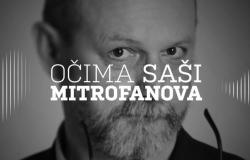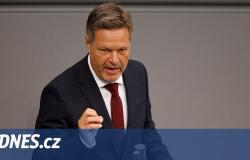You can also listen to the report in an audio version.
/From our special correspondent/
Georgia’s desire to join the West is evident at every step in the country. Already at the airport, I am interested in the flying flags of the European Union, then I see them in the streets next to signs condemning Russia for its aggression against Ukraine.
In a similar spirit, the conversation I am conducting with 28-year-old Gia is also carried out. “I don’t feel like it’s even a question yet. Of course, our country belongs more to the West. Who would want to belong to Russia after everything they are doing?” he confides to me while waiting for a bus in the former capital, Kutaisi.
The Caucasian country has been trying to limit Russian influence in waves ever since the collapse of the Soviet Union, of which it was a part. But she never quite succeeded. Even two years after the beginning of Russia’s invasion of Ukraine, it still stands somewhere in the middle between West and East, as the government is reluctant to cut ties with the Kremlin completely, despite calls from a large part of Georgians.
For many people, the current events in Ukraine resonate because in 2008, Georgia was the first country to experience the full extent of the aggression of Putin’s Russia. Since then, Moscow has effectively occupied two Georgian separatist territories, South Ossetia and Abkhazia.
“There is no doubt that Georgian society is very pro-Western. The Russian occupation convinced the country that the only way to avoid any repetition of it is to be part of the West,” Kacha Gogolashvili, director of European Union studies at the Georgian Foundation for Strategic and International Studies, explains to Seznam Zpravy.
Reunification with European family
Georgia is one step closer to the West after the country received the status of a candidate country for the European Union at the end of last year. It applied for membership after the beginning of the invasion, but unlike Ukraine and Moldova, it had to wait longer for the approval of the application by the twenty-seventh.
However, the efforts of all these states have a common driving force, namely the long-term threat of Russian aggression and the occupation of their territory. Although this very factor after the invasion contributed to the fact that the Union decided to step forward, it can also greatly complicate the final acceptance.
A large part of Georgian society is in favor of joining the European Union, surveys show that it is up to 90 percent of the 3.7 million inhabitants. At the same time, it follows from them that, in Georgia’s view, support for EU membership is not excluded from support for close relations with Russia.
Forty-two-year-old Saba, who works as a nurse in the capital Tbilisi, also supports joining the EU. “I don’t see a single reason why I should have it any other way. I think we should also join NATO, but I understand that it may still take some time,” she tells me, adding that people around her feel the same way.
Photo: Anna Hrdinová, Seznam Zpravy
President Salome Zourabišvili is also strongly pro-Western, who described the European Union’s decision as a “monumental milestone”. According to her, the country has regained the prospect of reunification with the European family.
For Georgia, joining the Union would be economically advantageous and would also provide it with certain security guarantees, while the EU would gain a strategic partner located between Russia and Turkey. After the flare-up and subsequent de-escalation of the conflict between Armenia and Azerbaijan in Nagorno-Karabakh, Georgia also plays a large role in the Union’s ambitions to strengthen stability in the South Caucasus.
However, the path to the EU will not be easy for the country, also due to its internal political problems, and it may drag on for several years. Tbilisi will have to fulfill a number of conditions, which concern, for example, the fight against corruption, the independence of the judiciary and the settlement of polarized domestic politics.
According to analyst Gogolashvili, this could be a problem given the state of democracy in the country. “Georgia has fallen behind in democratic development, as demonstrated by the attempt to adopt a Russian-inspired law on foreign agents. The road to the EU is also hampered by the zero policy towards radical anti-Western groups, the government’s reluctance to carry out important reforms, especially in the area of justice, and the oligarchization of the government itself,” he explains.
How is it admitted to the EU?
Any European state that recognizes its common values and undertakes to support them can apply for EU membership. Key are the so-called Copenhagen criteria, which include the stability of institutions guaranteeing democracy, the rule of law, human rights and respect and protection of minorities, a functioning market economy and the ability to accept the obligations arising from membership.
If a certain country wishes to accede to the Union, it submits its request to the Council of the EU, made up of representatives of the member states, which requests an opinion from the European Commission. If the opinion of the commission is favorable, the council can decide (unanimously) that the state will be granted the status of a candidate country. Based on the commission’s recommendation, the council will then – again unanimously – decide whether negotiations should begin.
It is also problematic that the ruling Georgian Dream party does not strongly condemn the Russian invasion of Ukraine, which it justifies with pragmatism. It therefore decided not to join the sanctions, after which it became one of Moscow’s key gateways for exports and imports.
“The government is defending itself by refusing to impose sanctions because it would hurt the Georgian economy. And also by the fact that Russia occupies 20 percent of our territory and cannot afford to provoke it in order to prevent any spillover of the conflict,” former Georgian diplomat Natalie Sabanadze explains to Seznam Zpravy. But this approach of the government is contradicted by the EU representatives.
The country’s direction will be decided by the autumn elections
The contradiction between government policy and Georgians’ desire to move towards the West was also manifested during last year’s large-scale protests, which were sparked by the aforementioned draft law on foreign agents.
According to critics, the legislation would move the country towards an authoritarian regime like Russia, and it received great criticism from the mouths of European representatives. Although the government withdrew the proposal in response to the storm of anger, it nevertheless maintains its ambivalent approach towards Moscow.
“Personally, I am wary and suspicious of intergovernmental relations between Georgia and Russia. I would much prefer our government to reflect the attitudes of the vast majority of people,” notes Givi, who works as a car salesman.
Reports from Georgia
Few countries have been transformed by Russia’s incursion into Ukraine as much as Georgia. The Caucasian country, which has a similar experience with Russia as Kiev, stands out against Moscow, but has become home to hundreds of thousands of Russians.

Whether the country will turn more towards the West or remain in the grip of Russia will be determined by the parliamentary elections that await Georgia in the fall.
“Russia will definitely be watching these elections, and so will the West. Moscow will support the (government) Georgian Dream and other pro-Russian parties. “Since the opposition is now fragmented and Georgian Dream has consolidated power in the country, the situation is very much in his hands,” Sabanadze explains. According to her, however, the situation is far from resolved, and the pro-Western camp can also celebrate.
Tags: divided country West government afraid provoking Russia
-







